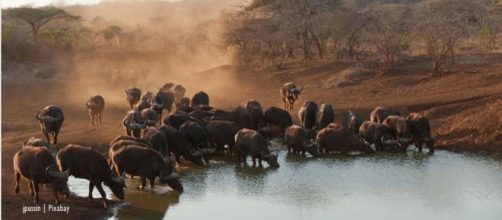Claude Kleynhans was a hunting safari operator with years of experience. In May this year, he was killed by a buffalo. In the wildlife-centric town of Hoedspruit near Kruger National Park, he was thought of as an ethical hunter. This means he had to adhere to strict quotas and rules for hunting. This is way outside of the uncontrolled and devastatingly cruel practices of poachers who snare animals, or stun them with bullets and hack off horns and tusks while they still live. Nevertheless, as Allthatsintersting.com points out, he has been mislabeled a poacher by animal lovers on social media.
Hunting debate rages on and gets vitriolic
When it comes to hunting, most voices are raised against the sustainable wildlife practice of hunting in Africa. However, the USA carries out the same quota system for hunters. Voices rise against them as well, but it seems Africa is the main target of those who assume there's enough space for all animals to live freely. In fact, across the continent, most wildlife authorities operate under the concept of diversity. In other words, no single species outweighs the importance of another. The anti-hunting fraternity often becomes vicious. For example, on Facebook, about the death of Claude Kleynhans, one person wrote, "This truly made my day. Best news ever.
Justice was served." Another noted, " I doubt that in heaven there are criminals like you. Your place is in the worst hell."
From the perspective of those professionals who dedicated their lives to conserving wildlife, there is a very different attitude. In his book," MacPherson's Elephant," long-term wildlife management expert and author, Edward Ostrosky made note of it. Although his book was fictionalized, much of it was based on 41 years of management and anti-poaching experience. He wrote: "While no layman would think of telling a surgeon, or even a television repairman how to do his job, everyone who has ever visited a game reserve...thinks they can run a reserve...better than those of us who have dedicated our lives to these professions."
Hunting discussions on social media possibly the most heated
The conservationists who believe that animals need to be controlled in order to not overstock reserves get a lot of trolling.
When asked if there are alternatives to letting the animals strip the land, starve and die lingering deaths, there are never any applicable answers. That's because scientists still don't know the answer on how to resolve the human/large animal conflicts that happen when wild animals become over-populated. When lions get chased out their territory, they become a real danger to locals living nearby. When buffalo populations increase beyond a sustainable level, they bring more danger to local people than many other animals with claws. Many people die from elephant attacks in Africa. But, if they are shot to control their numbers, people like Claude Kleynhans literally have critics dancing on their graves.
It matters not what side of the debate you take, you will likely get hate mail and nasty comments. People across the world who love nature and animals have that single common bond. It's the differences in opinion on how to best protect them that causes division. For a hunter like Kleynhans, he probably believed that he was helping to control animal numbers, create employment, and attach a value to wildlife. For others, it sticks in their craw, that wealthy people get enjoyment through a blood sport.
World Wildlife Fund calls for an international animal management committee
A recent call by the WWF was for an international committee to be set up. Rather like the Paris Climate Accord, the management of animal populations is envisaged to be overseen under a global set of rules.
Animal lovers who oppose hunting may be disappointed to note that they do support hunting activities, to a certain extent. According to their website, "In certain limited and rigorously controlled cases, including for threatened species, scientific evidence has shown that trophy hunting can be an effective conservation tool as part of a broad mix of strategies."
They also note that "Conservation programmes that include trophy hunting must be sustainable and benefit the wildlife populations of affected species, their habitats, and associated ecosystems. They must also benefit local communities and be legally, culturally and religiously appropriate within the region."
It would seem that even under a global committee, the clash between hunters and those who oppose the practice won't simply melt away.
Both sides have admirable opinions and objectives. For the animals trapped between humankind's rapacious appetite for stripping nature's resources in all its forms, the future looks bleak. The sad side of it all is that the only innocents in the hate-debate are the animals that die, either by starvation, poaching, an imbalanced ecosystem, or through the hunter's bullets.

